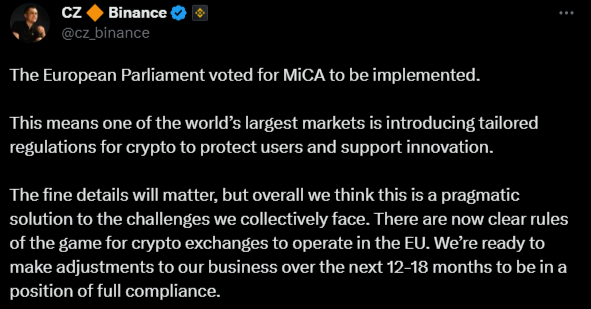The unexpected fall of the crypto exchange, FTX, has opened our eyes to the urgent and complex conversation about crypto regulations. It’s a vivid reminder of the balancing act between innovation and regulation, revealing a myriad of risks and rewards. So, it leads us all to wonder, should cryptocurrency be regulated?
It’s impossible to ignore the significant migration of open-source blockchain developers from the U.S. — a shift from 42% in 2018 to 29% by 2022, according to Solana Founder Solana’s co-founder, Anatoly Yakovenko. This is more than a statistic; it’s a story of change, a narrative of pioneers in search of a space where innovation flourishes unrestrained.

In this blog, we will dive deep into the intricate world of crypto regulations. We’ll sift through the nuances and discuss should cryptocurrency be regulated or not.
Should Cryptocurrency Be Regulated?
The crypto market has swiftly ascended to prominence since its birth, with a staggering 10,000 to 15,000 crypto assets navigating the digital waves, a figure that keeps burgeoning. We look at the burning question” Should cryptocurrency be regulated”. Following are few reasons why crypto should be regulated.
Empowering Consumers with Knowledge
In the expansive sea of digital currencies, many traders have anchored their understanding to a select few like Dogecoin, Ethereum, XRP, and Bitcoin. A myriad of other crypto treasures remain unexplored. It’s here that the need for a guiding regulatory light arises to illuminate the multitude of cryptos, making the journey safer for every digital sailor by providing insights into the potentials and risks associated.
Education on crypto regulations is our shield against the shadows lurking in the digital market, seeking to deceive unsuspecting investors. It’s essential for governments to step in and illuminate the path for consumers in this digital adventure.
Ensuring Fair Play in the Market
The world of crypto is often a roller-coaster ride, with steep climbs and sudden falls, coupled with instances of underhand dealings. Bitcoin’s journey in 2021 is a testament to this erratic nature. Implementing strong crypto regulations can be the seatbelt we all need on this thrilling but unpredictable ride, especially when reliable information is scarce, and the terrain is complex.
While the turbulent seas of crypto can offer a bounty for the experienced, the inexperienced can find themselves adrift, possibly losing more than just their bearings. Retail players in the crypto space already know the answer to the question “Should cryptocurrency be regulated” because they know how big players can eliminate their profits.
Addressing the Technological Evolution
With technology advancing at breakneck speed, there’s an ever-looming shadow of obsolescence over even the most revolutionary inventions like blockchain. It’s crucial for traders to have knowledgeable guides and clear channels of communication to navigate through the tech labyrinth associated with cryptos effectively.
With their arsenal of resources and knowledge, governments can play the role of the wise mentor, decoding the enigma of evolving technology and disseminating this wisdom to the masses.
Combating Illicit Financial Activities
Every uncharted territory has its share of pirates, and the crypto world is no exception. A stringent verification process is our path to uncover the real identities and intentions behind every transaction, bringing a sense of order to the unregulated chaos.
The fact remains, that despite the passionate arguments from crypto advocates, digital currencies have been avenues for shadowy transactions, highlighting the pressing need for a regulatory compass in this unregulated landscape.
Shielding from Cyber Threats
The voyage through the crypto ocean is fraught with the dangers of cyber-attacks and hacking. Governmental regulations can be the protective gear investors need to safeguard their digital treasures.
The breaches experienced by titans like Binance and the recent mishap with FTX are stark reminders of the vulnerabilities inherent in our digital journey, accentuating the urgency for establishing robust regulatory safeguards in the realm of cryptocurrencies.
What’s the Current Status of Crypto Regulations?
While the United States remains hesitant and enigmatic about its stance on cryptocurrency, the rest of the world seems to have shed its inhibitions and reservations. The international political scene is increasingly becoming receptive to cryptocurrencies. You can explore this report on how countries are jumping on the crypto bot to avoid the US dollar.
In a whirlwind of progressive legal adaptations, we’ve witnessed the European Union greenlighting MiCA, the United Kingdom sanctioning new cryptocurrency laws, and Hong Kong granting licenses to cryptocurrency exchanges.
In the Middle East, Dubai has initiated a dedicated crypto regulator, marking its stance on emerging digital assets. Moving to South America, Brazil has streamlined the process with the introduction of a virtual service provider license, showing its growing acknowledgment of virtual currencies. And not to be left behind, Japan is asserting its ambitions to morph into a global hub for cryptocurrency.

You can look at this X thread by Mitchell Hammer and understand why the US is way behind in the crypto innovation and several other countries will soon take over if amendments are not done.
Final Thoughts
The short and simple answer to the question” Should Cryptocurrency Be Regulated?” is yes. It’s a thrilling time to be part of this global financial renaissance! While the U.S. is still pondering its next move, countries around the world are eagerly welcoming the myriad possibilities that crypto regulations can bring. From Dubai to Japan, nations are crafting laws and embracing innovations, seeing crypto as more than just currency—it’s a chance to revitalize economies and create a world of opportunities.
These bold steps by countries are less about following a trend and more about understanding the immense potential and revolutionary change that crypto promises. It’s not just about the economic prospects; it’s about millions of people experiencing a new way of interacting with finance, creating a harmonious blend of digital and traditional.



